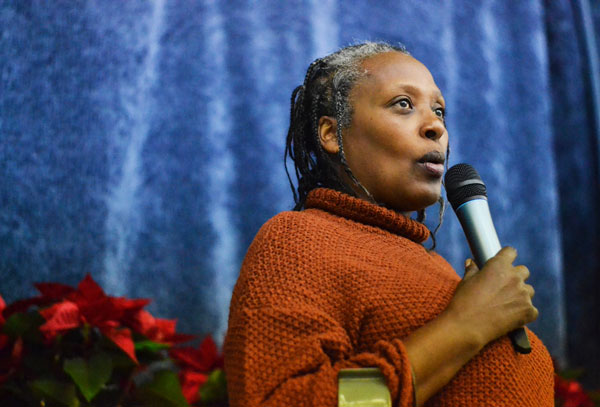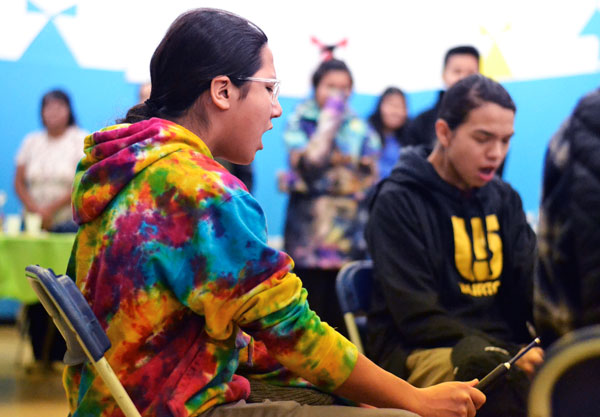
“Men, they’re so busy fighting for power, for money, for position, but we are fighting for life.” – Neema Namadamu
Neema Namadamu calls all women her sisters.
She’s an international women’s rights advocate and the founder of a non-profit organization that works to empower women and girls in the Democratic Republic of Congo (DRC) and worldwide.
Namadamu visited Wahpeton Dakota Nation on Thursday for a women-only luncheon. It was the start of a week-long tour for Namadamu and her team to work with women in Prince Albert and area.
“There are things that are very different here than in my home country, but there are also things that are the same. I’ve met some very strong women at Wahpeton Dakota Nation, women who are bold leaders in their community, and I’m looking forward to working with them to continue our vision of lifting up women across the globe,” said Namadamu in a news release.
The meeting opened with an honour song by Wahpeton drummers, followed by a performance from traditional and grass dancers. Namadamu posed for photos with all the people she’d met in her “sister community.”

Namadamu was born in the DRC. Without access to vaccines, she contracted polio as a toddler—a disease where the virus can invade your brain and spinal cord and cause paralysis.
She was living in a country where women were, and still are, seen as vastly inferior, especially those with disabilities. It’s a place filled with sexual violence and child marriage, Namadamu said.
“Men, they’re so busy fighting for power, for money, for position, but we are fighting for life,” she said.
Namadamu strayed from the life of a typical woman in her rural community of Itombwe, being the first woman with a disability from her ethnic group to earn a university degree. She went on to serve in her province’s Parliament, then as Advisor to Congo’s Minister of Gender and Family.
In 2012, her then 25-year-old daughter was the victim of a violent attack.
Namadamu made it her mission to bring peace to the oppressive society, so she founded the Maman Shujaa (Hero Women) Media Centre. As a small percentage of Congolese people know how to use the internet, the centre provided digital training to females in eastern DRC. They would use this training to share their stories effectively and learn about the world around them.
“With technology, you can empower anyone,” she said at the meeting in Wahpeton.
The Maman Shujaa Media Centre is run by Hero Women Rising, a non-profit that also runs programs such as Keep Girls in School, Girl Ambassadors for Peace, Technology for Transformation and Rural Health.
Its website opens with a quote from the peacemaker: “I am not interested in making a little noise, I’m looking to change the paradigm.”
Namadamu said in the DRC, having your period is a “taboo” topic.
“When girls have their first period, they couldn’t go to school because they don’t have any pads, any material,” she explained. “They get cut off, they can’t go to school every month. They stay home for seven days, five days.”
“It is not a shame,” she emphasized.

After Namadamu’s speech, many in attendance brought to light the similarities in their beliefs, such as the importance of nature.
Another Hero Women Rising program is Planting Trees. The DRC, home to the second-largest rainforest in the world, is suffering from deforestation.
Other people who spoke shared their stories experiencing inequality.
Rosalie Tsannie-Burseth is the associate director of education for the Prince Albert Grand Council (PAGC).
“My mom wanted to marry me off to an older man. It was an arranged marriage, they told me to get married,” said Tsannie-Burseth.
“I said no. I’m not doing that. Long story short, I finally got married…on my own terms.” The room clapped.
In the DRC, explained Namadamu, some women are arranged for marriage at the ages of 14 or 15.
“Our community is a good fit for this initiative. The Wahpeton Dakota Nation is traditionally a matriarchal society, and when making decisions, we regularly seek input from both male and female citizens,” said Chief John Waditaka.
Namadamu has won several awards, including the Inspirational Women Leader award by the World Women Leadership Congress & Awards and the Outstanding Women Leadership Award by the World CSR Congress.
She is presenting at Carlton Comprehensive Public High School on Friday at 9 a.m. On Monday at the Parkland Hall, she is presenting with the PAGC Women’s Commission from 1 p.m. to 4 p.m.
This is a corrected story. This story has been edited to clarify that it is the Democratic Republic of Congo that Namadamu hails from, not the Congo, as well as to clarify some elements of life in the DRC and to clarify the relationship between the Maman Shujaa Media Centre and Hero Women Rising. The Herald regrets the errors.

